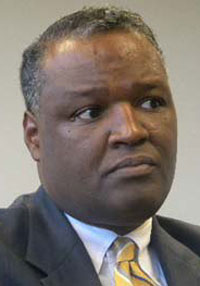
Prince George’s County Executive Rushern Baker: Let’s talk about economic justice, before we legalize marijuana
By Rushern Baker, (County Executive, Prince George’s County, Md.)
If we’re going to begin to repair the damage from the War on Drugs, we need to temporarily pump the breaks on our efforts to legalize recreational marijuana in Maryland.
The issue is a rare policy separation between me and my Democratic primary opponents. Why? Because I can think of no greater insult to the people and communities who have suffered from the biased and unbalanced enforcement of our past drug laws than to not address the impact of our past approach, as we rush toward the legalization of recreational marijuana.
As we change our laws, consideration of those who bore the greatest burden from our past prosecutions should not be a mere asterisk. We must fiercely advocate for those who have suffered the most and provide a path to opportunity before we legalize marijuana for personal use in Maryland. Bills with aspirational language are not enough. We need a commitment to specifics, execution, and measurable goals, because in the end, it’s not about policy, it’s about people.
While many advocates tout legalization as a remedy to past injustice, the statistics on those who benefit economically tell a different story. As legalization has surged across the United States, an estimated 3,600 dispensaries have opened nationwide. Only 32 are owned by African Americans. In Maryland, our first dispensary licenses granted for medical marijuana ended with zero awards to firms owned by African Americans. The facts don’t lie.
Starting as far back as the Nixon Administration, law enforcement and policy makers waged a War on Drugs that disproportionately impacted minority communities. The often cited and in-depth ACLU study “The War on Marijuana In Black and White” found that between 2001 and 2010 there were 8 million marijuana arrests in the United States; 88 percent of those for simple possession.
This study also found that even though Blacks and Whites used marijuana at the same rate, Blacks were nearly four times more likely to be arrested than their White counterparts.
In Maryland, the numbers are even worse. Two of the top four jurisdictions with the highest arrest rates per 100,000 residents in the country can be found in Maryland: Worcester County and Baltimore City, ranked first and fourth respectively. Black men and women made up 92 percent of all marijuana arrests in Baltimore City.
Beyond statistics, the generational effect that these policies have had on people remains devastating. Entire families and communities of color continue to struggle with loss of jobs, opportunities, benefits, family separation and incarceration. A recent Harvard University study found the stigma of incarceration impacts the lives of Black men and their families for far longer and at a greater rate than any other ethnic group. Blacks earn an estimated $7,000 per year less than their White counterparts after their first year of release from incarceration.
Yet, expungement seems to be the only remedy given some consideration in the legalization discussion and in our current system.
Sales of marijuana for adult use in Maryland could easily range between $464 to $800 million dollars annually. And while the tax revenue would be significant, removing the majority of marijuana possession-related crimes from our books could also free up resources in our courts and public safety units to help reduce violence and strengthen communities. However, once we stop counting dollars, what happens to social equity, fairness, and opportunity for those that need it most?
As Governor, I want plans for entrepreneurship and jobs that significantly reach the communities devastated by the bias of our past drug policies. Beyond a promise of revenue allocation to programs for jobs and treatment services, we must be committed to creating lasting economic opportunity that’s not likely to be subjected to political whim or patronage. A significant portion of tax revenue from sales of marijuana for adult use should be directed for education, career development, child care, housing, and other restorative initiatives for the people locked up for simple possession or who paid fines, or lost jobs during the period of relevance.
I will champion a plan for mass expungement or vacating charges that puts little to no burden on those prosecuted under our past marijuana possession laws. I want to know that retail marijuana operations will not be disproportionately housed in some communities and that grow-house and exterior production will be done with full consideration for our environmental sustainability goals.
The irony of my standing alone, demanding these fair and just terms before we allow another wave of outside entrepreneurs to profit from what we once considered a scourge, should give the voters of Maryland cause for concern. We have more leverage to seek economic justice, before we legalize marijuana for personal use than we will after the pockets of lobbyists, business interests, and government coffers overflow with millions of dollars.